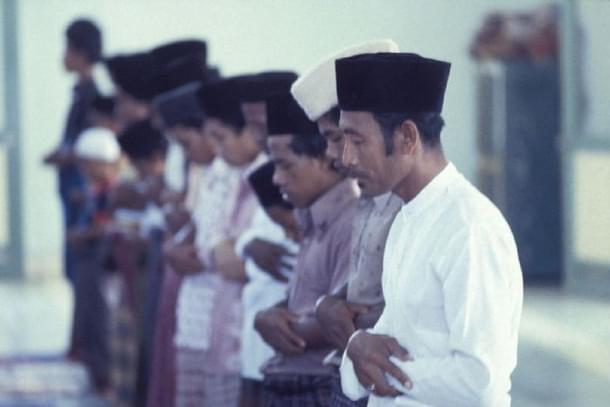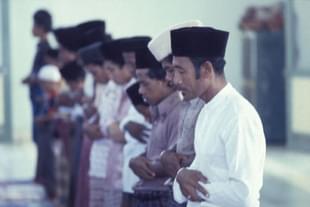Culture
Islam Nusantara: What Indian Islam Needs To Learn From This Indonesian Adaptation
Arshia Malik
Jul 09, 2023, 05:30 PM | Updated 05:30 PM IST
Save & read from anywhere!
Bookmark stories for easy access on any device or the Swarajya app.


The Indian government has invited suggestions for implementation of the Uniform Civil Code, but due to the Muslim pressure groups like the AIMPLB (All India Muslim Personal Law Board), could be hesitating to venture into the area of theology, in fear of hurting religious sentiments.
The events of 1986 Shah Bano case are not that far in history and some of the players involved are still alive, the memories fresh of how Muslim rabble-rousing activists, academics, jurists, and pressure groups can hold a government and its millions of population hostage to an archaic interpretation of Islam just to maintain control over the masses — a vestige of the Muslim League actions in the 1940s.
The traditional Ulema love to keep the masses under the chokehold of the fear of hellfire, superstition, and victimhood.
It is a fallacy that sharia laws are derived solely from the Quran, the Prophet's Sunna (examples), Ijma (consensus of scholars) and Qisas (personal reasoning of scholars). There are five other sources of sharia laws including local customs, independent opinion, public interest, equity consensus, and presumption of continuity.
Sharia laws are mentioned only thrice in the Quran, once as a noun, twice as a verb. The word 'sharia' literally means the path made by animals going to a spot of flowing water (watering hole) or flowing water itself.
Symbolically, it means path to salvation or Nirvana. The mention in the holy book is as ethical guidance or moral code. The Quran itself defines the mission of all Prophets — to guide the flock towards a good moral conduct and code.
But the transformation of this spiritual 'moral guidance' to political 'sharia law' was a major betrayal that is now being covered by scholars, thinkers and authors around the Muslim world. Once such author is Professor Ahmet T Kuru from Turkey.
Ahmet T Kuru is a professor of political science and the director of the Centre for Islamic and Arabic Studies at San Diego State University. He is the author of Islam, Authoritarianism, and Underdevelopment: A Global and Historical Comparison (2019).
His book provides a fantastic deep dive into the longue duree of Islamic history to explain why underdevelopment and authoritarianism are so prevalent in the contemporary Islamic world.
Professor Kuru offers a novel theory that focuses on how an alliance between religious (Ulema) and state officials (Caliph's court) led inexorably to economic underdevelopment and political authoritarianism in the Muslim world.
The book is a powerful response to those who assert that Islam is inherently anti-intellectual and authoritarian, as well as those who contend that colonialism and neo-colonialism are solely responsible for whatever problems exist in the Muslim World.
Muhammad Sa'id al-'Ashmawi, a retired Egyptian Supreme Court justice and former head of the Court of State Security and a specialist in comparative and Islamic law at Cairo University, warns Muslims about the betrayal when he says the Quran defines Sharia as an ethical orientation and does not support the misuse of the term "Sharia" to justify any form of state or political power.
Hasan Mahmud, author of How Sharia-ism Hijacked Islam to emphasise how sharia laws are not set in stone, narrates, “When I was a child, my mother once instructed me to “go and take shower.” Yet another day she told me, “Don’t take shower.” Was she an idiot? Not at all. On the first day, I came home dirty from playground. The other day I had fever. She kept the value of my welfare intact and changed her instruction to suit the present reality.
"It is similar in Islam. With a changing society, the social laws must change to keep the values intact. This process of abrogation is called 'Nashkh.' It is not repealing the dictum; it is like doctors changing prescriptions with the changing conditions of the patient."
What India can learn from and adopt is Islam Nusantara, also known as Nusantara Islam or Indonesian Islam — the unique expression of Islam in the Indonesian archipelago, which encompasses the diverse cultures and traditions of the region.
The term "Nusantara" refers to the Malay-Indonesian term for the Indonesian archipelago, which includes thousands of islands spread across Southeast Asia.
Islam arrived in the Indonesian archipelago around the 13th century, primarily through trade and the influence of Muslim traders and scholars from the Middle East and India.
Over time, Islam in Indonesia incorporated local customs, traditions, and beliefs, resulting in a distinctive form of Islam that blends elements of local culture and Islamic teachings.
The term was first introduced by the Indonesian Islamic organisation Nahdlatul Ulama in 2015, as an alternative to the interpretation and representation of global Islam that is currently dominated by Arabisation —that is, Saudi Wahhabism.
Islam Nusantara emphasises moderation, tolerance, and the compatibility of Islamic values with local traditions and customs. It embraces the cultural diversity of Indonesia and promotes peaceful coexistence among different religious and ethnic groups.
It highlights the principles of inclusiveness, pluralism, and mutual respect, emphasising the importance of social harmony and unity.
Islam Nusantara has its roots in the early history of Islam in Indonesia when Muslim scholars and mystics interacted with local cultures and traditions. This interaction led to the development of a unique form of Islam, that is both Islamic and Indonesian.
Prominent figures and organisations have played significant roles in promoting and advocating for Islam Nusantara.
For instance, the late president of Indonesia, Abdurrahman Wahid (also known as Gus Dur), was a strong advocate of Islam Nusantara. He emphasised the importance of cultural diversity and pluralism within Islam and sought to counter radical interpretations of the religion.
The concept of Islam Nusantara has been a response to the rise of conservative and radical Islamic ideologies in recent years. It aims to promote a peaceful and inclusive understanding of Islam that aligns with the values of Indonesian society.
The main tenets of Islam Nusantara are Tawassut (moderation) emphasising the importance of moderation and avoiding extremism; Rahmah (compassion) which teaches that Muslims should be compassionate and merciful towards others; Anti-radicalism — rejecting violence and terrorism; Inclusiveness — being open to all people, regardless of their race, ethnicity, or social class; and finally, tolerance of other religions and cultures.
Islam Nusantara has been praised by some for its moderation and its ability to adapt to local cultures. However, it has also been criticised by others for being too syncretic and for not being "pure" enough.
Despite the criticism, Islam Nusantara remains an important force in Indonesian Islam. It is the official ideology of Nahdlatul Ulama, the largest Muslim organisation in Indonesia, and it is also gaining popularity among other Muslim groups in the country.
An Indian adaptation of Islam Nusantara, involving the dominant Deoband school of thought and various others would be a valuable form of Islam that has the potential to contribute to the development of a more peaceful and tolerant subcontinent.
Arshia Malik is a columnist and commentator on social issues with particular emphasis on Islam in the Indian subcontinent.





